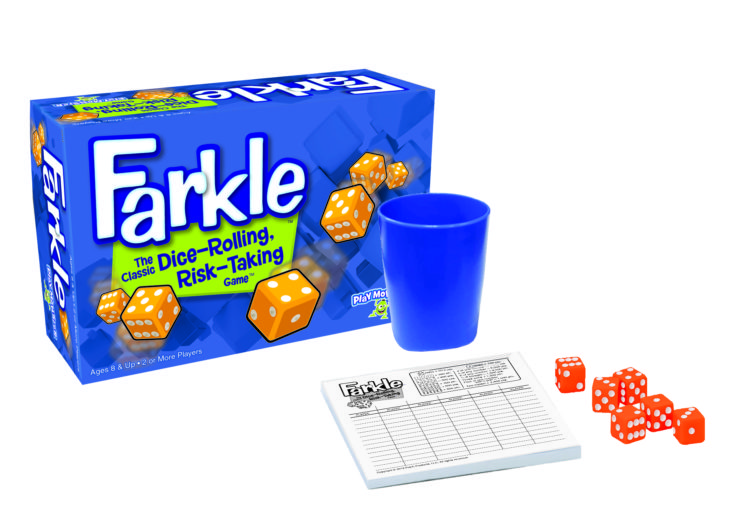Farkle is a dice game where players try to roll the most points possible without getting Farkled! Farkle is played with six dice, as well as paper and a pencil to keep score and track of points. When you roll six dice, remove only the dice you want to use for points, then re-roll the remaining dice. Points are scored by specific numbers (5 or 1), or sets of the same number. The players can bank their points, and decide when to end their turn at any time. That being said, some scoring dice must be removed after every roll so if no scoring dice are rolled on a player’s turn, they end their turn with zero points (this is called getting “Farkled”)! The game ends when the winning player reaches 10,000 or more points! This game is a great way to obtain fluency in addition of multi-digit numbers.
by specific numbers (5 or 1), or sets of the same number. The players can bank their points, and decide when to end their turn at any time. That being said, some scoring dice must be removed after every roll so if no scoring dice are rolled on a player’s turn, they end their turn with zero points (this is called getting “Farkled”)! The game ends when the winning player reaches 10,000 or more points! This game is a great way to obtain fluency in addition of multi-digit numbers.
Game Instructions:
Farkle can be played with two players or more. During the game players take turns and one player usually keeps score. A dice cup can be used to roll the dice if desired (included with the game if purchased in a store). To begin, all players will roll one die and whoever has the highest roll goes first. The player will roll all six dice at once in the play area, any dice that roll off the playing area must be rolled again. The player will then analyze their rolled dice to determine how many points they received for that roll. The player will set aside at least one die that is worth points and will re-roll the rest of them. Please see below for scoring rules. The player must remove at least one die after each roll, and keep a running total of points for that turn. If a player is lucky enough to set aside all six dice (this can be the result of multiple rolls), they are allowed to roll them all again to build a running total. If the player cannot set aside any dice after a roll, that’s a Farkle! A Farkle can happen at any time a player rolls. That player will lose their running total of points for that turn (meaning they receive a score of zero that round), and then it is the next player’s turn. In order for a player to earn points on the score pad for the first time, they must have a running total of at least 500 points. Once a player reaches 10,000 or more points, all of the other players have one last turn to accumulate the most points possible. The player with the highest score wins the game!
one die and whoever has the highest roll goes first. The player will roll all six dice at once in the play area, any dice that roll off the playing area must be rolled again. The player will then analyze their rolled dice to determine how many points they received for that roll. The player will set aside at least one die that is worth points and will re-roll the rest of them. Please see below for scoring rules. The player must remove at least one die after each roll, and keep a running total of points for that turn. If a player is lucky enough to set aside all six dice (this can be the result of multiple rolls), they are allowed to roll them all again to build a running total. If the player cannot set aside any dice after a roll, that’s a Farkle! A Farkle can happen at any time a player rolls. That player will lose their running total of points for that turn (meaning they receive a score of zero that round), and then it is the next player’s turn. In order for a player to earn points on the score pad for the first time, they must have a running total of at least 500 points. Once a player reaches 10,000 or more points, all of the other players have one last turn to accumulate the most points possible. The player with the highest score wins the game!
Scoring Rules:
Single 1 = 100
Single 5 = 50
Three 1’s = 300
Three 2’s = 200
Three 3’s = 300
Three 4’s = 400
Three 5’s = 500
Three 6’s = 600
Four of any number = 1,000
Five of any number = 2,000
Six of any number = 3,000
1-6 straight = 1,500
Three pairs = 1,500
Four of any number with a pair = 1,500
Two triplets = 2,500
Click on this link for Student Resources
Click on this link for Teacher Resources
Curriculum Connections
Coming soon.
Connections to Processes
Communication [C]: While playing Farkle, students must continuously announce their playing strategies to ensure they are following the rules, and to communicate with the scorekeeper. Every time a player decides to either keep their current score or continue rolling, they must communicate with everyone. It is also a good habit for the students to communicate with each other, as it leads to more opportunities for students to practice multi-digit addition.
Connections [CN]: Students are exposed to dice games not only in class but at home as well. Students will be able to use those experiences and connect them to Farkle. During the game, students will practice their ability to subitize the number of dots on the 6 faces of the die, which is a common skill that will aid them later in life. In the game, students will also be learning mathematics as they practice multi-digit addition and gain an understanding of probability.
Mental Mathematics and Estimation [ME]: Students must calculate without external aids how many points each of their rolls receive. Students must also keep track of their running total by adding their banked points. To challenge students they can choose not to use the scoring explanation sheets and instead they can multiply the base numbers to understand the worth of their roll, e.g. scoring three fours is done by multiplying the base number by 100 [4X100=400].
Reasoning [R]: During the game, students must use reasoning to analyze the next logical move. Students need to understand the probability of scoring more points or being farkled. Once they reach their conclusion students will engage in conversation with the other players justifying their decision. If students play in partners then this is even more prominent as they must confidently communicate their logic on how they believe the team should proceed and they are able to listen to and contemplate the reasoning of their partner as well.



One thought on “Farkle”